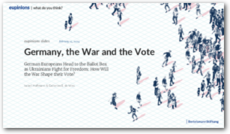German Europeans Head to the Ballot Box as Ukrainians Fight for Freedom: How Will the War Shape their Vote?
Bertelsmann Stiftung (ed.)
Isabell Hoffmann & Catherine E. de Vries
Germany, the War and the Vote
- Format Type
- Date of publication
- 14/02/2024
- DOI
- 10.11586/2024014
- Edition
- 1. edition
- Volume/Format
- 19 pages, PDF
Format
-
PDF
Price
Free of charge
Description
Russia’s full-scale invasion of Ukraine has had a profound impact on EU policies and politics. The European Union and its member states have steadfastly supported Ukraine in its defensive efforts while simultaneously aiming to curb Russia’s aggression. This support has been manifested through unprecedented financial and economic sanctions imposed on Russia and its principal actors, as well as the provision of weapons and financial assistance to Ukraine. EU member states have also opened their doors to Ukrainian refugees, and Ukraine, once a distant neighbour, is now actively pursuing accession to become a full EU member.
Driven by pivotal events, this strategic shift and accelerated decision-making have gained widespread public support. However, in recent months, we have observed an emerging decline in this support as the war enters its third year and other crises become apparent – developments that are redirecting public attention and sensitivities.
The timing of these shifts is of particular significance, as they coincide with the crucial re-election of European leadership in 2024. As EU citizens prepare to cast their votes for a new European Parliament in June, closely followed by the nomination of a new European Commission, this publication seeks to provide a deeper understanding of how policies on Ukraine intersect with political orientations and party preferences.
In this country report "Germany, the War and the Vote", we explore the relationship between political party preferences in Germany and seven key Ukraine-related policy questions:
- Does the European Union need a common defence policy?
- Should the EU support Ukraine by delivering weapons?
- Should your country accept refugees from Ukraine?
- Should the EU accept Ukraine as a member state in the coming years?
- Should the EU become more energy independent of Russia even if that means prices are rising even further?
- Do you think economic and financial sanctions on Russia are effective or ineffective?
- Do you think the reconstruction of Ukraine will be an economic opportunity or an economic burden?
This report “Germany, the War and the Vote” is part of an eight-part series.
Part 1
• The War and the Vote
delves into the correlation of political orientation and support for Ukraine policies in the EU as well
as seven member states.
Parts 2-8
Part 1 is complemented by seven country reports, each focusing on political party preferences in
correlation with the same Ukraine-related questions:
• Belgium, the War and the Vote
• France, the War and the Vote
• Germany, the War and the Vote
• Italy, the War and the Vote
• The Netherlands, the War and the Vote
• Poland, the War and the Vote
• Spain, the War and the Vote






